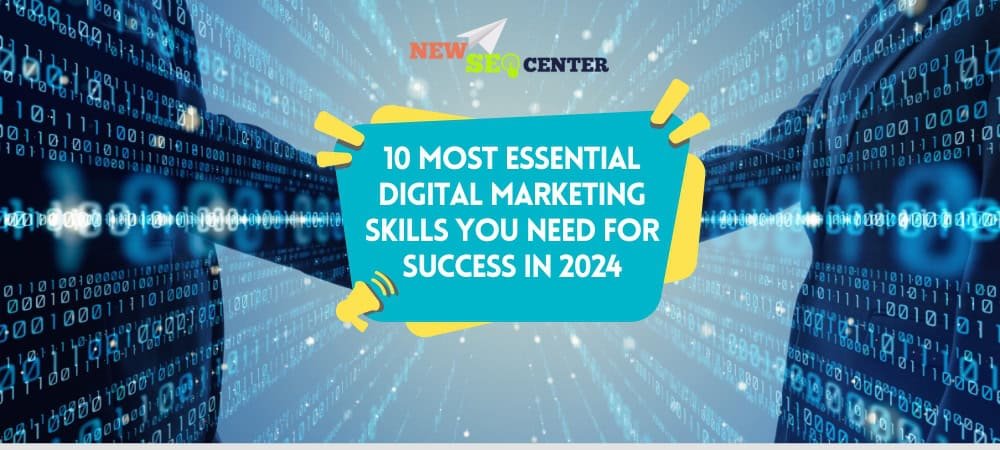
10 Most Essential Digital Marketing Skills You Need For Success in 2024
As the digital landscape continues to evolve, acquiring the right digital marketing skills is more crucial than ever for professionals aiming to thrive in this dynamic field.
With the expansion of online platforms, the ability to adeptly navigate through various marketing strategies can significantly boost your career and enhance your brand’s growth.
This guide delves into the top skills you need to master by 2024, from SEO and content creation to video marketing and beyond.
Each skill is tailored to meet the changing demands of the market, ensuring you stay ahead in the competitive digital marketing space.
Let’s explore these essential skills that promise to elevate your professional journey and drive success.
What is Digital Marketing?
Digital marketing encompasses a broad range of online strategies aimed at reaching, engaging, and converting virtual audiences.
By adeptly employing these tactics, companies can significantly enhance their online presence and customer engagement, leveraging digital marketing skills effectively.
This approach is integral to modern marketing efforts, adapting to consumer behaviors that increasingly lean towards digital interactions and transactions.
Through adept utilization of these strategies, firms can notably augment their online presence and engagement with customers.
Mastering these high-income skills in digital marketing not only boosts a company’s visibility but also opens lucrative career opportunities for professionals.
10 Must-Have Digital Marketing Skills for 2024
To thrive in 2024, digital marketers should master skills like:
1. Email Marketing
Email marketing remains a cornerstone of effective digital marketing strategies. It involves sending tailored messages to a list of subscribers to promote products, services, or content.
The success of email marketing hinges on its ability to target specific customer segments with precision.
Here are the steps to learn and master email marketing:
- Understand the Basics: Start by familiarizing yourself with what email marketing entails, including the types of emails (newsletters, promotional, transactional), and the goals it can achieve.
- Choose the Right Tools: Select an email marketing platform that fits your needs. Options like Mailchimp, Constant Contact, and GetResponse offer varying features that cater to different marketing strategies.
- Build Your List: Focus on building a robust email list. Employ strategies such as offering free downloads, subscription forms on your website, and promotions through social media to gather emails ethically and effectively.
- Segment Your Audience: Divide your email list into segments based on demographics, purchase history, or engagement levels. This allows for more personalized and effective messaging.
- Craft Engaging Content: Develop compelling email content that resonates with your audience. This includes strong subject lines, relevant information, and attractive designs.
- Test and Optimize: Use A/B testing to experiment with different elements of your emails to see what works best. Regularly update your approach based on analytics and feedback.
- Stay Compliant: Ensure you comply with email marketing laws and regulations, such as GDPR and CAN-SPAM, to maintain trust and legal integrity.
By following these steps, you can effectively harness the power of email marketing to reach your audience and achieve your business goals.
2. Search Engine Optimization (SEO)
Transitionally, SEO involves refining online content to appeal to search engines, ensuring it ranks favorably for specific keyword searches.
As the digital realm continues to grow, SEO is increasingly crucial for enhancing the visibility and accessibility of web content.
Here’s how to start learning SEO effectively:
- Grasp the Basics: Begin with understanding the core principles of SEO, including the difference between on-page and off-page SEO, and the role of keywords in content optimization.
- Learn Keyword Research: Master the art of identifying and using keywords that your target audience is searching for. Tools like Google Keyword Planner and Ahrefs can provide insights into search volume and keyword difficulty.
- Optimize Website Structure: Ensure that your website is structured in a way that search engines understand. This includes using proper tags for titles, meta descriptions, and headers, and optimizing URL structures.
- Create Quality Content: Content is king in the world of SEO. Focus on creating informative, engaging, and keyword-rich content that provides real value to your audience.
- Build Links: Understand the importance of link building and develop strategies to get other websites to link back to your site. This helps to improve your site’s authority and ranking.
- Utilize Analytics: Track your SEO progress and the impact of your efforts with tools like Google Analytics and Google Search Console. These tools can help you understand what works and what doesn’t.
- Stay Updated: SEO is ever-changing with frequent updates to algorithms. Keep yourself informed with the latest SEO news and practices to stay ahead in the game.
Through meticulous adherence to these steps, you can establish a robust SEO foundation, evolving your strategies to align with current standards effectively.
3. Video Marketing
Harness video marketing to captivate audiences, amplify brand visibility, and elevate online presence, mastering essential digital marketing skills.
As video content continues to dominate user engagement across digital platforms, understanding how to effectively harness this medium is crucial.
Here are practical steps to learn and excel in video marketing:
- Understand the Fundamentals: Start by learning the basics of video marketing, including different types of videos such as explainer videos, live broadcasts, and customer testimonials.
- Set Clear Objectives: Define what you aim to achieve with your video marketing efforts. Whether it’s increasing brand awareness, driving sales, or engaging with customers, having clear goals helps guide your content strategy.
- Learn About Your Audience: Identify and understand your target audience. Knowing their preferences, browsing habits, and content consumption patterns will help you create videos that resonate with them.
- Invest in Good Equipment: While professional equipment is ideal, starting with basic gear like a good smartphone camera, a microphone, and proper lighting can also produce quality content.
- Focus on Storytelling: Engaging content tells a story. Plan your videos around a narrative that captivates viewers, communicates your message, and aligns with your brand identity.
- Master Editing: Learning basic video editing skills is essential. Tools like Adobe Premiere Pro, Final Cut Pro, or more user-friendly options like Camtasia can help you edit your videos effectively.
- Optimize for SEO: Just like written content, videos need to be optimized for search engines. Include relevant keywords in your video title, description, and tags to improve visibility.
- Distribute Widely: Share your videos across multiple platforms such as YouTube, social media, and your website. This increases your reach and maximizes engagement.
- Analyze Performance: Use analytics to track the performance of your videos. Tools like YouTube Analytics can provide valuable insights into viewer behavior, engagement rates, and more.
- Iterate and Improve: Continuously refine your approach based on analytics and feedback. Experiment with different formats and strategies to see what works best for your audience and goals.
By adhering to these steps, you can craft a potent video marketing strategy that both captivates your audience and yields significant results.
4. Social Network Marketing
Social network marketing is a crucial strategy for connecting with customers and promoting your brand across various social platforms.
As social media continues to evolve, marketers must adapt to new trends and technologies to effectively engage their audience.
Here are essential steps to learn and master social network marketing:
- Understand Different Platforms: Start by familiarizing yourself with the major social media platforms such as Facebook, Instagram, Twitter, and LinkedIn. Each platform has unique features and audiences, requiring tailored approaches.
- Define Your Goals: Determine what you want to achieve through social media marketing. Goals can range from increasing brand awareness to driving website traffic or boosting customer engagement.
- Identify Your Audience: Knowing who your audience is and what they want to see on social media is crucial. This understanding will guide your content creation and promotional strategies.
- Create a Content Calendar: Plan your content in advance. A content calendar helps you post consistently and cover all important dates and events relevant to your brand.
- Engage with Your Audience: Social media is all about interaction. Regularly engage with your followers through comments, messages, and posts. Prompt responses encourage more interaction and build trust.
- Leverage Multimedia: Utilize various forms of content such as images, videos, infographics, and live streams to keep your audience engaged and interested in your posts.
- Monitor Trends: Stay up-to-date with the latest social media trends and adapt your strategies accordingly. This could involve using new features like stories or reels, or adjusting your content to what’s currently popular.
- Analyze Your Results: Use the analytics tools provided by social media platforms to track your performance. Analyzing data like engagement rates, click-through rates, and demographic information helps you refine your strategy.
- Adapt and Optimize: Based on the insights gained from analytics, continuously adapt and optimize your social media strategy to improve results and reach more people.
- Stay Informed on Best Practices: Social media is dynamic, with frequent changes in algorithms and user preferences. Keep learning about best practices and ethical guidelines to enhance your social media presence responsibly.
By adhering to these guidelines, you can effectively leverage social network marketing to expand your brand and engage a wider audience.
5. Writing
Writing is an indispensable digital marketing skills that enhances how you communicate with your audience and convey your brand’s message.
Whether it’s crafting compelling blog posts, creating engaging social media content, or developing persuasive advertising copy, writing is at the heart of effective digital marketing.
Here’s how to sharpen your writing skills:
- Understand Your Objectives: Begin with a clear understanding of what you aim to achieve with your writing. Is it to inform, persuade, or entertain? Knowing your purpose sets the direction of your content.
- Know Your Audience: Tailor your writing style and content to the preferences and needs of your target audience. Understanding who they are helps you create relevant and appealing content.
- Practice Regularly: Like any skill, writing improves with practice. Commit to writing regularly to hone your skills and find your unique voice.
- Read Widely and Often: Exposure to different writing styles and content types can inspire and inform your own writing. Reading widely in and outside your industry can spark new ideas and perspectives.
- Learn SEO Basics: For digital marketing, it’s crucial to understand how to optimize your content for search engines. Integrating SEO practices into your writing helps ensure that your content is found by the right audience.
- Edit and Revise: Good writing often involves revising and refining your first drafts. Use tools like Grammarly or seek feedback from peers to improve clarity, grammar, and flow.
- Use Engaging and Relevant Examples: Draw on relevant examples and anecdotes to make abstract concepts concrete and relatable to your readers.
- Stay Updated on Industry Trends: Keep your content fresh and relevant by staying informed about the latest digital marketing trends and shifts in consumer behavior.
- Experiment with Different Formats: Don’t limit yourself to one form of writing. Experiment with various formats like blogs, scripts for videos, social media posts, and email newsletters to enhance your versatility.
- Reflect on Feedback: Use the feedback from readers and analytics (like engagement and bounce rates) to learn what works and what doesn’t, and continuously adapt your strategy.
By mastering these steps, you can enhance your writing skills, thus significantly improving digital marketing effectiveness and fostering deeper audience engagement.
6. Conversion Rate Optimization (CRO)
Conversion Rate Optimization (CRO) is a vital digital marketing skills aimed at increasing the percentage of visitors to a website who convert into customers or take desired actions.
By mastering CRO, you can greatly enhance business outcomes, as it improves user experience and optimizes marketing efforts effectively.
effective CRO strategies:
- Understand the Basics: Start by learning what CRO involves, including the fundamental principles of how and why visitors engage with your site, and the psychology behind user decisions.
- Set Clear Goals: Define what conversions mean for your site, whether it’s sales, newsletter sign-ups, or another action. Knowing what you’re optimizing for is crucial to effective CRO.
- Analyze Current Performance: Use analytics tools to assess where your site currently stands in terms of conversion rates. Look at metrics like bounce rate, exit pages, and user flow.
- Learn About User Experience (UX): Understanding UX principles is key to improving site usability, which directly impacts conversion rates. Study how site design and functionality affect user behavior.
- Implement A/B Testing: Regularly test different elements of your website to see what changes lead to better conversion rates. This could include experimenting with different call-to-action buttons, headlines, or page layouts.
- Optimize Landing Pages: Ensure your landing pages are compelling and directly relevant to your visitors’ interests. They should have a clear value proposition and call to action.
- Focus on Copywriting: Effective copy is crucial for conversions. Learn to write persuasive, clear, and action-oriented copy that encourages users to take the next step.
- Enhance Page Load Speed: Page speed is a critical factor for keeping visitors on your site. Optimize images, streamline code, and consider switching to faster hosting if necessary.
- Use Heatmaps and User Recordings: Tools like heatmaps and session recordings can offer insights into how users interact with your site, helping identify areas for improvement.
- Iterate and Improve: CRO is an ongoing process. Continuously analyze the results of your tests and make adjustments based on data and user feedback.
By developing expertise in these areas, you can effectively enhance your website’s conversion rates, making CRO a powerful digital marketing skill that drives business success.
7. Blogging
Blogging is an essential digital marketing skill that helps establish authority, engage with an audience, and improve SEO.
As we navigate the ever-evolving digital landscape, mastering blogging can provide a substantial advantage.
blogging skills effectively:
- Understand Your Niche: Start by identifying and understanding the niche in which you wish to blog. Knowing your area of expertise helps tailor content to the interests and needs of your audience.
- Research Your Audience: Knowing who your readers are allows you to create content that resonates deeply with them. Use analytics tools to understand audience demographics and preferences.
- Set Clear Objectives: Define what you aim to achieve with your blog. Objectives can range from driving traffic to generating leads or positioning yourself as an industry leader.
- Plan Your Content: Develop a content strategy that outlines what you will write about, how often you will post, and what formats you will use. A content calendar can help organize and schedule posts effectively.
- Focus on Quality Content: Invest time in creating high-quality, informative, and engaging content. Good content should provide value, answer questions, and solve problems for your readers.
- Optimize for SEO: Enhance your blog’s visibility by optimizing content for search engines. Include relevant keywords, meta descriptions, and tags to improve your blog’s SEO.
- Promote Your Blog: Use social media, email newsletters, and other digital marketing strategies to promote your blog posts. Engaging with other bloggers and participating in online communities can also increase visibility.
- Engage with Readers: Encourage and respond to comments on your blog. Engaging with your readers builds a community and fosters loyalty.
- Monitor Performance: Use tools like Google Analytics to track your blog’s performance. Analyzing metrics such as page views, user behavior, and engagement rates can provide insights for improvement.
- Continuously Learn and Adapt: The blogging world is dynamic. Stay updated with the latest blogging trends, technologies, and best practices. Adapt your strategies to align with changing reader expectations and industry standards.
By mastering these steps, you can cultivate a thriving blog, thereby enhancing your digital marketing skills and bolstering your online presence.
8. Teamwork Skills
Teamwork skills are pivotal in digital marketing, where collaborative efforts often lead to more innovative and effective campaigns.
As the field encompasses various specialties—SEO, content creation, analytics, and more—being able to work efficiently with others is essential.
Step to Teamwork Mastery
- Understand Team Dynamics: Recognize the roles and strengths of different team members. Appreciating each member’s unique contributions can help you leverage their skills effectively.
- Communicate Effectively: Clear communication is the backbone of effective teamwork. Regularly share updates, feedback, and concerns with your team. Tools like Slack or Microsoft Teams can facilitate smooth communication.
- Set Common Goals: Align with your team on shared objectives and strategies. This ensures everyone is moving in the same direction and understands the overarching goals of your projects.
- Embrace Diversity: Diverse teams bring varied perspectives and ideas, which can enhance creativity and innovation in your campaigns. Be open to different viewpoints and learn from the diverse experiences of your team members.
- Foster a Collaborative Environment: Encourage a culture of collaboration by sharing information, resources, and credit. A supportive environment promotes a sense of community and mutual respect.
- Resolve Conflicts Constructively: Address disagreements or conflicts openly and professionally. Effective conflict resolution can prevent issues from hindering the team’s progress and can actually strengthen team bonds.
- Participate Actively: Be a proactive member of your team. Offer help, take initiative, and seek input from others. Active participation shows your commitment and encourages others to contribute as well.
- Learn and Adapt: Digital marketing is ever-changing. Keep learning new skills and tools that can benefit your team. Stay adaptable and be willing to adjust your strategies based on team feedback and industry trends.
- Develop Leadership Skills: Even if you are not in a leadership role, developing leadership skills like decision-making, accountability, and motivation can greatly enhance team effectiveness.
- Celebrate Successes Together: Acknowledge and celebrate the achievements of your team. Recognizing each other’s successes can boost morale and motivate the team to continue performing well.
By cultivating these teamwork skills, you can enhance your role within a digital marketing team, contributing to more successful and cohesive projects.
This enhances not only team productivity but also fosters your professional growth in the digital marketing domain.
9. Paid Ads
Paid advertising is a crucial component of digital marketing, allowing brands to reach a targeted audience quickly and effectively.
With online spaces growing more competitive, proficiency in paid ads can vastly improve your marketing tactics and outcomes.
steps to learn and excel in paid advertising:
- Understand Different Ad Platforms: Begin by familiarizing yourself with various ad platforms like Google Ads, Facebook Ads, LinkedIn Ads, and others. Each platform has unique features and caters to different audiences.
- Define Your Objectives: Clearly define what you want to achieve with your paid ad campaigns. Objectives can include increasing brand awareness, generating leads, driving sales, or boosting website traffic.
- Learn Targeting Options: Each advertising platform offers different targeting options such as demographic, geographic, behavioral, and retargeting. Understanding these options will help you reach the right audience effectively.
- Set a Budget: Determine how much you are willing to spend on your campaigns. Learning to set and manage budgets is crucial to ensure you maximize ROI without overspending.
- Create Compelling Ad Content: Develop ads that capture attention and encourage action. This includes crafting engaging headlines, using high-quality visuals, and creating clear, persuasive calls to action.
- Test and Optimize: Use A/B testing to compare different versions of your ads to see which performs better. Continuously analyze and adjust your ads based on performance data to optimize your campaigns.
- Understand Ad Analytics: Familiarize yourself with analytics tools provided by ad platforms to track the success of your campaigns. Understanding metrics like click-through rates, conversion rates, and cost per acquisition is essential.
- Follow Ad Compliance: Each platform has its own rules and guidelines for advertisements. Ensure your ads comply with these regulations to avoid penalties or campaign suspensions.
- Stay Updated with Trends: Paid advertising is constantly evolving with new tools and updates. Keeping up-to-date with industry trends and changes in ad platform algorithms can keep your skills relevant.
- Leverage Industry Resources: Engage with online communities, take courses, and read up on best practices in paid advertising to deepen your knowledge and improve your skills.
10. Personal Branding
Personal branding is increasingly recognized as a pivotal digital marketing skills, essential for professionals looking to differentiate themselves and elevate their market presence.
It’s about strategically presenting yourself to the world in a way that emphasizes your strengths and unique qualities.
develop your personal branding:
- Define Your Brand: Start by identifying what you want your personal brand to represent. Consider your strengths, passions, and the unique value you bring to your industry.
- Establish Your Online Presence: Create a professional website and active social media profiles where you can showcase your expertise and interact with your audience. Platforms like LinkedIn, Twitter, and a personal blog are great tools for this.
- Consistent Messaging: Ensure that your communication across all platforms is consistent. This consistency helps in building a recognizable and reliable brand image.
- Create Quality Content: Share insights, write articles, or produce videos that reflect your professional knowledge and personality. This content should provide value, helping you build credibility and authority in your field.
- Engage with Your Community: Regularly interact with your followers, peers, and industry leaders. Engagement increases your visibility and helps establish you as an active participant in your field.
- Network Strategically: Attend industry conferences, seminars, and networking events to connect with like-minded professionals and potential mentors. Networking is crucial for brand growth and learning opportunities.
- Seek Feedback: Listen to feedback from your peers and audience. This insight can guide you in refining your brand and tailoring your content to better meet the needs of your audience.
- Monitor Your Online Reputation: Keep an eye on how your brand is perceived online. Tools like Google Alerts can help you track mentions of your name or brand across the web.
- Be Authentic: Authenticity is key in personal branding. Be true to yourself and your values, as authenticity resonates strongly with audiences.
- Continuously Learn and Adapt: Stay updated with the latest trends in your industry and digital marketing. Adapting to new technologies and methodologies can keep your brand relevant and engaging.
Developing a robust personal brand involves more than visibility or popularity; it’s about fostering trust, respect, and influence for career advancement.
By adhering to these steps, you can proficiently establish and sustain a personal brand that distinguishes itself in the digital marketing realm.
Wrapping Up
In conclusion, this educational guide from NewSEOcenter aims to equip you with the essential digital marketing skills necessary for success in 2024.
Each skill—from email marketing to personal branding—is crucial for navigating the complexities of the online marketing world.
As you implement these strategies, remember to continually adapt and refine your approach based on new learnings and industry trends.
By staying proactive and committed to your development, you’ll be well-prepared to leverage these skills effectively and achieve your professional goals.



